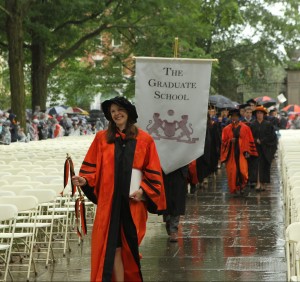
I’m going to be honest: I had originally never intended to apply to graduate school. In fact, one of my many reasons for studying engineering in college was straightforward, if not overly simplistic: an engineering degree, I believed, could land me a relatively good job without having to pursue a graduate degree. I didn’t want to take another standardized test, and above all, I didn’t feel like I would enjoy research. Rather than theory, I preferred engineering and building things, and I wasn’t convinced that was what people with graduate degrees went on to do.
The summer after my freshman year was when I first started to reconsider my decision not to continue with higher education. I got the opportunity to participate in a Research Experience for Undergraduates (REU) at Rice University that summer, helping to develop optical sensors. I knew nothing about the field prior to that, but spending the summer surrounded by enthusiastic PhD candidates was enough to make me reconsider that a graduate degree in an engineering discipline was useless. It helped that optics is such a deep and convoluted field that requires a good deal of physics knowledge to navigate well — it convinced me that in certain cases, it certainly does make sense to obtain extra training and background even if the end goal is to engineer systems.
I ended up spending a good amount of my undergraduate career and all my summers engaging in research. Contrary to my expectations, I have found it a useful contrast to working on coursework, which actually often turned out to be more theoretical than the research I do. Because research takes knowledge beyond the tough jargon in a textbook and the equations needed for a problem set, I started to feel much more confident in what I was learning. I certainly can’t deny the difficulty in navigating an environment in which it constantly feels like I know too little to really contribute, but in the end, I have found it satisfying to see my efforts put into concrete work.
Last year, as senior year started looming ever closer, I started thinking about the possibility of pursuing a Master’s degree in Electrical Engineering. In considering that decision, I found it useful to ask myself: Why exactly did I want to pursue a graduate degree? What did I want to get out of it? In the end, I realized the answer was that I wanted to keep learning. Especially after speaking to current graduate students who had worked before, either in internships or before pursuing higher education, I became interested in higher education to acquire further technical breadth, not only more specialized technical skills. Either way, whether or not I decided to stay in the field of optics, there were so many other fields I wanted to learn from — image processing, robotics, systems engineering — and looking at potential projects in those fields excited my sense of intellectual curiosity. As had been the case when I had engaged in research, I liked the idea of continuing to build on my background in order to make me a more versatile and able engineer.
I suggest that if you’re considering applying to graduate school, whether it be a Master’s or a PhD, that you ask yourself the same questions. Why do you want to get that degree? Is there something you think you can get out of it that you can’t just from working? Deciding on the next path after college isn’t an easy decision by any means, but if you put thought into thinking about these key points, you’ll maximize the chances you’ll make a decision you’re happy with.
-Stacey Huang, Engineering Correspondent
Note: If you haven’t read the counterpart to this post by Bennett McIntosh, “On [not] applying to grad school”, check it out here!

